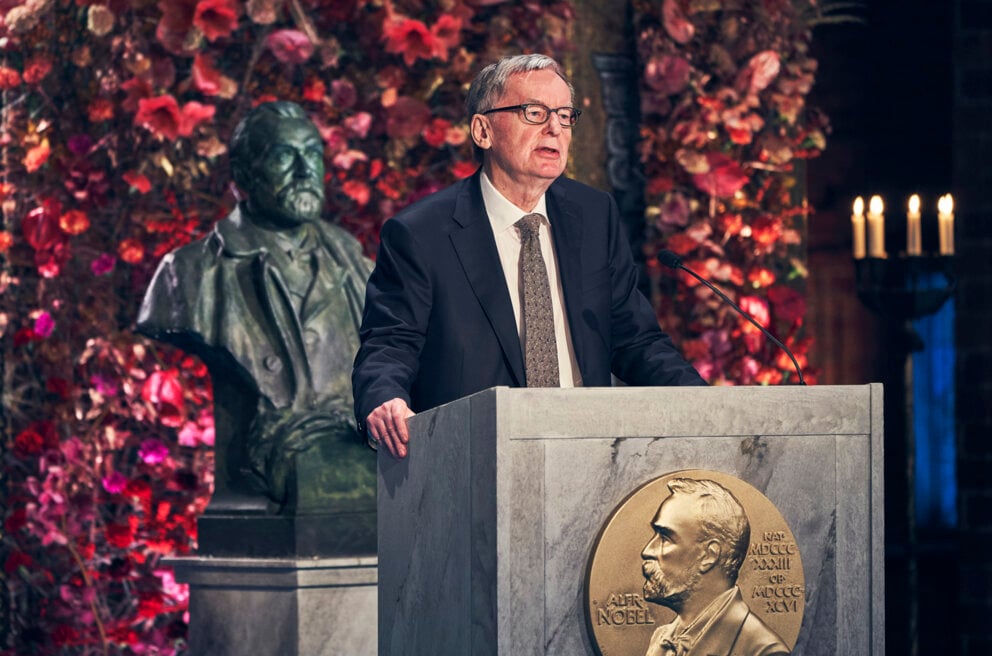Award ceremony speech

Professor Anders Olsson delivering the presentation speech for the 2020 Nobel Prize in Literature.
© Nobel Prize Outreach. Photo: Dan Lepp
English
Swedish
Presentation Speech by Professor Anders Olsson, Member of the Swedish Academy, Chairman of the Nobel Committee for Literature, 10 December 2020.
Your Majesties, Esteemed Nobel Laureates, Ladies and Gentlemen
Everything finds new meaning in retrospect. In the American poet Louise Glück’s work Faithful and Virtuous Night from 2014 there is a poem titled “Afterword”, not at the end of the book but in the middle. The poem is an intermission, where the person speaking takes a pause to reread what he has written. The speaker is an elderly painter who has reached the critical point where his brush freezes at the aspect of chaos and where he has to confront belief in individual fate. He talks about the philosopher Immanuel Kant’s “exalted solitude” on his walks to the bridges of Königsberg. Parenthetically, the painter adds: “(We share a birthday.)” Checking, you find that Louise Glück was born on the same day as Kant, the 22nd of April, and Kant’s themes are also hers: they include the sublime, but also our imprisonment in perceptions and difficulties in grasping reality. The writing painter is a thin mask for the poet to enunciate through.
Louise Glück’s poems are written in retrospect. Childhood and taut relationships with parents and siblings are motifs that have never loosened their grip. Glück has produced twelve collections of poetry and a couple of volumes of essays on poetry, all marked by a drive for clarity. Nobody is more adamant than she against self-illusions. The autobiographical material is crucial, but Glück is scarcely a confessional poet. The “truth” to be revealed detours through imagination and vicarious voices, like the painter´s. In several of her books, Glück speaks through mythical figures such as Dido, Persephone or Eurydice. They are masks transcribing private intimacies into something as universal as it is ambiguous. Glücks lyrical discourse has one of its premises in the divided self, as testified by the red poppy in the collection The Wild Iris from 1992: “in truth / I am speaking now / the way you do. I speak / because I am shattered.” In her writing two contentious truths can share the last word. And this is what happens in her poem “Afterword”:
Shall I be raised from death, the spirit asks.
And the sun says yes.
And the desert answers
your voice is sand scattered in wind.
Aside from the world of classical myth, Glück’s principal literary reservoir is the rich heritage of English-language poetry. It can be what she has called the ”inward listening” in John Keats, the solitary, demanding voice of Emily Dickinson, or the tone of urgency in T.S. Eliot. She is drawn to the intimate voice that invites participation. Significant is Glück’s discovery how to make poetry of her spoken language in the Ararat collection from 1990. She gives us almost brutally open-hearted images of family life, freed from all poetic edifice, but also a masterly sense of lyrical form and architecture.
Louise Glück is a writer not only of contradictions and austere reflection. She is also a poet of renewal, with few coequals. Even if her poetry is written in retrospect, and seems bound to the apple tree as it was seen once in childhood, one of her keywords is change. She teaches us that the moment of renewal is also the arrival of words. Her inner driving force is a spiritual hunger and an exceptional reverence for the possibilities of poetry. The leap of renewal can employ the seemingly plain diction of thoughtful parables, but also comedy and biting wit. And when Louise Glück in her later work confronts the inevitable end, there is a remarkable grace and lightness in her touch. It is a note that lingers and can carry us readers forward as well.
Dear Louise Glück, on behalf of the Swedish Academy, it is my privilege to convey to you our warmest congratulations to the Nobel Prize in Literature 2020.
Copyright © The Nobel Foundation 2020
Nobel Prizes and laureates
See them all presented here.
